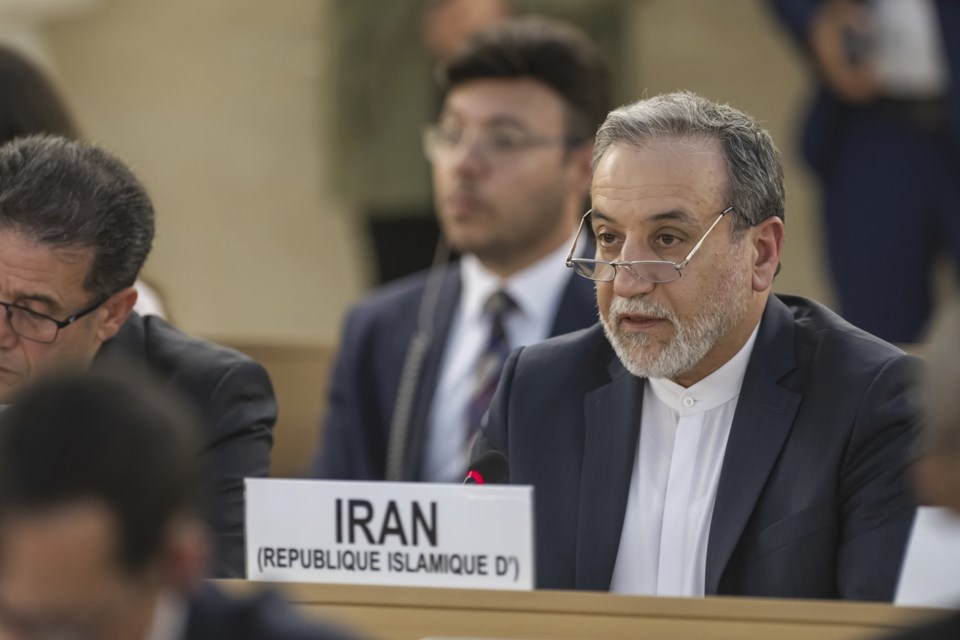GENEVA (AP) — A meeting between Iran’s foreign minister and top European diplomats on Friday yielded hopes of further talks but no indication of any immediate concrete breakthrough, a week after the crisis centered on the Iranian nuclear program erupted into war between Israel and Tehran.
Foreign ministers from Britain, France and Germany, as well as the European Union's foreign policy chief, emerged from talks at a Geneva hotel about 3 1/2 hours after Iran's Abbas Araghchi arrived for the meeting.
It was the first face-to-face meeting between Western and Iranian officials since the start of the conflict.
“The good result today is that we leave the room with the impression that the Iranian side is fundamentally ready to continue talking about all important issues,” German Foreign Minister Johann Wadephul said. He said the two sides had held “very serious talks.”
British Foreign Secretary David Lammy said that “we are keen to continue ongoing discussions and negotiations with Iran, and we urge Iran to continue their talks with the United States.” He added that “we were clear: Iran cannot have a nuclear weapon.”
EU foreign policy chief Kaja Kallas said ”we agreed that we will discuss nuclear but also broader issues that we have, and keep the discussions open."
The diplomats gave few details and took no questions.
The United States is considering how to proceed
Lammy traveled to Geneva after meeting in Washington with U.S. Secretary of State Marco Rubio and President Donald Trump’s Mideast envoy, Steve Witkoff.
Trump has been weighing whether to attack Iran by striking its well-defended Fordo uranium enrichment facility, which is buried under a mountain and widely considered to be out of reach of all but America’s “bunker-buster” bombs. He said Wednesday that he’ll decide within two weeks whether the U.S. military will get directly involved in the war given the “substantial chance” for renewed negotiations over Tehran’s nuclear program.
Israel says it launched its airstrike campaign to stop Iran from getting closer to being able to build a nuclear weapon. Iran and the United States had been negotiating over the possibility of a new diplomatic deal over Tehran’s program, though Trump has said Israel’s campaign came after a 60-day window he set for the talks.
French Foreign Minister Jean-Noël Barrot said that “we wanted to open a discussion with the Iranian foreign minister because we believe that there is no definitive solution by military means to the Iranian nuclear problem — military operations may delay it but they can't eliminate it.”
Iran said open to dialogue but no negotiations while attacks continue
Iran’s supreme leader rejectedU.S. calls for surrender Wednesday and warned that any military involvement by the Americans would cause “irreparable damage to them.”
Before Friday's talks, Araghchi said in an interview aired by Iranian state television that “in the current situation, as the Zionist regime’s attacks continue, we are not seeking negotiations with anyone.”
He said that “we have nothing to discuss with the United States, which is a partner in these crimes,” and Tehran rejected negotiations with the Americans.
”As for others, if they seek dialogue, not negotiations, which don’t make sense right now, we have no problem with that,” he added. He said that Friday’s discussion would focus “solely on the nuclear issue and regional matters” and Iran won’t hold talks on its missiles with anyone.
Just before meeting the European diplomats, Araghchi made a brief appearance before the U.N. Human Rights Council in Geneva. He said that Israel’s “attacks on nuclear facilities are grave war crimes,” and insisted that “we are entitled … and determined to defend our territorial integrity, national sovereignty and security with all force.”
Iran has long insisted its nuclear program is peaceful, though it was the only non-nuclear-armed state to enrich uranium up to 60%, a short, technical step away from weapons-grade levels of 90%.
The three European countries played an important role in the negotiations over the original 2015 nuclear deal between Iran and world powers. But they have repeatedly threatened to reinstate sanctions that were lifted under the deal if Iran does not improve its cooperation with the U.N. nuclear watchdog, the International Atomic Energy Agency.
__
Associated Press writers Geir Moulson in Berlin, Sylvie Corbet in Paris and Jill Lawless in London contributed to this report.
—-
The Associated Press receives support for nuclear security coverage from the Carnegie Corporation of New York and Outrider Foundation. The AP is solely responsible for all content.
—-
Additional AP coverage of the nuclear landscape: https://apnews.com/projects/the-new-nuclear-landscape/
Jamey Keaten, The Associated Press



